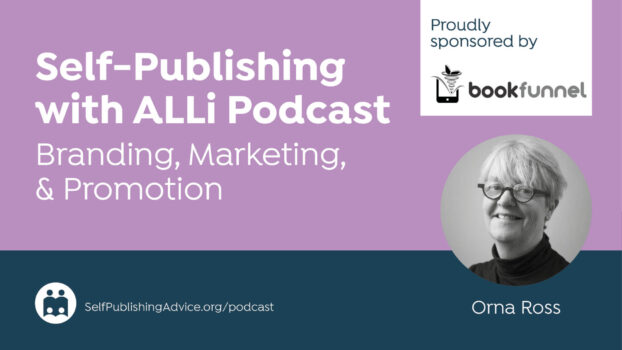
Orna Ross, creative entrepreneur and authorpreneur
We hear much these days about the rise of the author as entrepreneur, writes Orna Ross, founder and director of ALLi, the Alliance of Independent Authors. Both #authorpreneur and #creativepreneur are lively hashtags on Twitter and expanding categories on Amazon, Kobo and other online stores.
But how many authors understand what this means, let alone fall into this category?
What is an entrepreneur? What is a creative entrepreneur, an author-entrepreneur or “authorpreneur” as it's sometimes called?
Should all indie authors aim for this? If yes, what does it take to combine art and entrepreneurship, craft and commerce, into a successful author enterprise?
What Is An Entrepreneur?

(Photo by Jonathan Crews via Unsplash.com)
There is debate over the very definition of an entrepreneur. For some, it includes anyone who runs a business.
More accurately, I think, an entrepreneur is considered to be a certain kind of business-person. The kind who is more innovative and imaginative, the kind who consciously harnesses creative thinking to generate value from their ideas.
Creating value is the crucial point. Other people have to value the offering enough to pay for it at the right price.
- For an inventor to be considered an entrepreneur, she needs to go beyond a good idea or blueprint, to building a product that people want to buy, and a business-structure that takes it to market.
- For an author to be considered an entrepreneur, he needs to go beyond a finished manuscript to making a book that people want to buy. And then to build the business-structure that will take it to readers.
These are three distinct activities, each with its own set of challenges and skills.
Successful entrepreneurs:
1. Come up with an idea for a new product or service for a particular customer base
2. Test their concept and modify accordingly
3. Raise funding and recruit a team
4. Make their product/package their service
5. Reach out to their customer base and sell to them
6. Create a business structure that generates profit, so they can keep on making and selling their product/service
Successful self-publishing authors:
1. Come up with an idea for a new book
2. Send a draft to beta readers, editors, or other qualified others for critique
3. Beg, borrow or steal enough to pay for editorial, design and production
4. Turn the manuscript into ebook, pbook and maybe abook, translations or other formats
5. Reach out to readers and sell to them
6. Create a business structure that generates a profit, so they can keep on making and selling books.

(Photo by Aaron Burden via Unsplash.com)
Authors can resist the truth of all this and it's not surprising.
Writing a book, making a book, selling a book, building a business: it's quadruply challenging to do all these things at once.
First time out, it can feel overwhelming.
And it never gets easy, contrary to all those murky marketeers talking about passive income. As you continue and produce more books, you will always find it a challenge to balance the three aspects of your author business: crafter, director and entrepreneur.
Some writers balk at all this before they get started. They find entrepreneurial/business language off-putting. It can feel too commercial, crass, not creative enough.
But if we want to create a successful indie author enterprise, there's no way of dodging business. The moment you press “publish” on an online platform, you are in business, whether you know it or not.
That doesn't mean you have to handle everything yourself, you'll need to hire help for the bits you're not good at, but many of us before we are in a position to hire help must first of all help ourselves.
We must change our minds about what it means to be an author these days.
If you can't change your mind, you can't change anything–including making the changes needed to make more money, write more books, reach more readers and run a sustainable author business.
Authors who say things like, “I love writing, but I hate marketing” haven’t yet absorbed the challenge inherent in successful self-publishing. They are almost guaranteeing the failure of their author business.
What about you?
Can you ignite in yourself the characteristics of an creative director and entrepreneur? This is essentially applying the creative process you're already bringing to your writing and publishing into your book business.
When it comes to reaching readers, and building a sustainable income, can you be:
- Imaginative and visionary: Can you envisage the outcome you want for your author business and create something from nothing, by working steadily towards that desired outcome?
- Independent: Can you ignore mob mentality and fix on the business models, income streams, micro-niche and readers that will deliver the perfect you-shaped enterprise?
- Optimistic: Can you break out of the pessimism that’s endemic in publishing and believe your own creative potential applied to business as well as books?
- Passionate: Can you love your book ideas enough to follow your passion, your mission, your sense of life purpose, all the way into successful selling?
- Resilient: Can you bounce back from disappointments, turn things around when they go wrong, see the opportunities in failure?
- Resourceful: Can you figure out what you need to get ahead, process problems and overcome challenges, know when it's time to let go of a method, a mindset or a person who does not serve your creative intentions for yourself, your work and the wider good?
- Self-confident: Can you get over yourself, and the inevitable moments of self-doubt, and do the next necessary thing?
At ALLi, we have observed that the moment when members start to take off–start to get clear about their offering and niche, start to reach growing bands of fans and followers, start to stand out and scale up and make good money–is the moment when they accept what it means to be a creative entrepreneur.
Acceptance of all the aspects of the job is the moment that propels them from being someone who writes and publishes to being someone who knows they can make a sustainable living from writing and publishing.

(Photo by Danielle Macinnes via Unsplash.com)
OTHER INSPIRING POSTS ABOUT BEING AN AUTHORPRENEUR
from the ALLi Author Advice blog archive





I recently came across unique handmade paintings and modern artwork at Vitri Design Studio and was truly impressed by the creativity and detailing. If you’re looking for premium wall art, canvas paintings, or customized artwork for home décor, this site has some of the best collections online. Highly recommended for art lovers and interior enthusiasts!
Really useful points on authorship and entrepreneurship. Authors must certainly learn to be entrepreneurs.
Dear Orna, I wanted to express my gratitude for crafting such a well-crafted article. It was purely coincidental that I stumbled upon it, and I am astounded by the remarkable parallels between being an author and an entrepreneur. This realization has consumed my thoughts, and the more I contemplate it, the more it resonates with me.
Nevertheless, I can’t help but notice that, as a society, we tend to hold entrepreneurs in higher regard than authors. It appears that when an entrepreneur experiences multiple failures, we tend to brush it off, citing that “failure is just part of being an entrepreneur.” Conversely, if an author doesn’t achieve immediate success with their debut novel, they are often unfairly labeled as a failure.
Thank you for your attention, and I look forward to hearing your insights on this matter.
The popularity of Beautiful ganpati paintings is not uncommon. The deity is known throughout the world. Because of this very reason, numerous Indian artists are coming up with unique and gorgeous designs in Beautiful ganpati paintings wall paintings. Beautiful ganpati paintings is the Hindu deity worshiped to remove obstacles and bless people with good fortune
wall paintings
Being an entrepreneur is the best choice for me too 🙂 I relate to this article.
THanks for sharing.
steal enough to pay the editors and design…ha ha ha this one really nailed it.
Your way of writing is awesome, I just loved it thanks for sharing this wonderful in-depth article.
I love your comparison between authorship and entrepreneurship. I certainly agree with your points. However, we easily accept the struggles and failures of entrepreneurs , but authors I believe are scrutinized rather aggressively. None the less , this post will surely help to erase the divide and stop glorifying one over the other.
Thank you for creating such a well-thought article, Orna! I stumbled on it by chance and cannot believe the kind of similarities that exist between an author and an entrepreneur. Now, I can’t stop thinking about it and the more I think about it, the more it makes sense.
However, I do feel that as a society, we give more respect to entrepreneurs than authors. For instance, if an entrepreneur fails several times, we dismiss it because ‘failure is a part of being an entrepreneur’. But if an author isn’t successful with his/her very first novel, they’re labelled as a loser.
I love your comparison between authorship and entrepreneurship. I certainly agree with your points. Thanks for sharing.
Excellent questions and points to raise in deciding the direction we want to take our creative business. Thank you!
Marvellous, glad you found it helpful, Kari!
I agree with we authors that are entrepreneurial. I would call us Authorprenuers who create new books using innovative ideas who in addition to writing market our works.
Great to meet a sister “preneur”, Grace, thanks for commenting!
A well made point, Orna. Becoming an entrepreneur who can envision far more than just the creative processes of writing and perhaps commissioning a cover really is THE big test of self-publishing. I didn’t even try to pass it until I had three full-length titles to market, but when I finally went for it (October 2016) I found it easier than I’d imagined to hit my milestone goals.
Which brings me to my point: the process was relatively frictionless for me because I’d spent the years while I was writing those three books learning and experimenting wherever I could. The input ALLi receives from established authorpreneurs was a valuable part of this process. I think it’s worth encouraging newer writers to think of themselves as authorpreneur apprentices, under no immediate pressure to demonstrate success but adopting an attitude of open-minded learning. Their first books are apprentice pieces that can later be changed and adapted to the writer they become during their apprentice years.
Yet eventually all apprentices have to become masters or fail in their apprenticeship, and that’s something all writers have got to keep in mind. If you’re going to sustain a writing career (the goal of most of us) you’ve got to either learn the skills you don’t already have, or learn how to manage people and services that have those skills. It’s that sustainability factor that seems to defeat the majority of self-publishers.
Jane and Orna,
It’s just up my street to think of myself as an apprentice first. It leaves room for making mistakes and learning by them, which is good news for me.
I’m finding that ‘optimism’ is tricky for many authors, but I’m pleased to see it on the list along with ‘passion’. Both these are things I can rally bags of and so this article has given me much hope and encouragement!
Now what I need to deal with is my ‘impatience’. There’s no golden bullet and that’s okay, but I find I have to remind myself of this almost daily.
I just think we write that first book (could take years) and then expect to be a viable business within a year, or some such. My brother-in-law set up his business and had to grow it for five years before turning a profit – he’s really successful now.
I’ve significantly reduced the time it takes to make new products, but building that client base takes time. I would be interested to know, how much time you both think an apprentice should realistically plan to have a good client base up and running, in terms of years? And what kind of client numbers we should be looking for at that point?
Any guidance, would be wonderful!
I would say, from observation of members, that once you have three books in one genre, things begin to take off. As to readers/clients, that one really is impossible to answer as it depends on your product mix (have you some kind of premium product attached to your books), what formats you offer (print, audio, ebook), your price points and so on. Working all of this out, and then making it happen, is what takes the time. I’d say, looking at most members, that two years after the publication of the first book, is the average time it takes to be up and running,